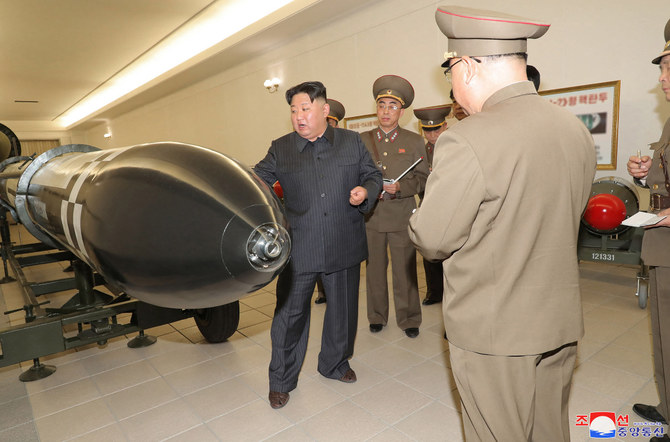
- ARAB NEWS
- 12 Jul 2025

SEOUL, South Korea: The national security advisers of the United States, South Korea and Japan called on Saturday for a stronger international push to suppress North Korea’s development of nuclear weapons and missiles and its military cooperation with other countries amid concerns about its alleged arms transfers to Russia.
The meeting in Seoul came as tensions on the Korean Peninsula are at their highest in years, with North Korean leader Kim Jong Un accelerating the expansion of his nuclear and missile program and flaunting an escalatory nuclear doctrine that authorizes the preemptive use of nuclear weapons.
The United States and its Asian allies have responded by increasing the visibility of their trilateral security cooperation in the region and strengthening their combined military exercises, which Kim condemns as invasion rehearsals.
In a joint news conference after the meeting, Cho said the three security advisers reaffirmed North Korea’s obligations under multiple UN Security Council resolutions that call for its denuclearization and bans any weapons trade with other countries.
“We agreed to strengthen a coordination among the three countries to secure the international community’s strict implementation” of the UN Security Council resolutions, Cho said.
Cho said the three also highly praised South Korea, the US, Japan and Australia announcing their own sanctions on North Korea over its spy satellite launch last month. North Korea argues it the right to launch spy satellites to monitor US and South Korean military activities and enhance the threat of its nuclear-capable missiles.
Washington, Seoul and Tokyo have also expressed concerns about a potential arms alignment between North Korea and Russia. They worry Kim is providing badly needed munitions to help Russian President Vladimir Putin wage war in Ukraine in exchange for Russian technology assistance to upgrade his nuclear-armed military.
Following the meeting, US national security adviser Jake Sullivan said Washington is working with Seoul and Tokyo to strengthen defense cooperation. He said they also seek to improve response to North Korean missile testing and space launch activities, including a real-time information sharing arrangement on North Korean missile launches that the countries plan to start in December.
Sullivan said the countries will also respond to North Korean cybercrimes, cryptocurrency money laundering and other efforts to bypass US-led international sanctions aimed at choking off funds going to its nuclear weapons and missile program.
“When it comes to the DPRK, we are keeping our eye on the ball, because it continues to represent a threat to international peace and security and regional peace and security,” Sullivan said, using the initials of North Korea’s formal name, the Democratic People’s Republic of Korea.
Sullivan held separate bilateral talks Friday with South Korea’s national security office director, Cho Tae-yong, and Japan’s national security secretariat secretary general, Takeo Akiba.
Sullivan also met with South Korean President Yoon Suk Yeol.
At a dinner reception for Sullivan and Akiba on Friday, Yoon said it is critical the three countries continue to build on his August summit with US President Joe Biden and Japanese Prime Minister Fumio Kishida at Camp David, where they vowed to deepen security and economic cooperation.
South Korea’s presidential office said Sullivan expressed support for the South’s recent decision to partially suspend a 2018 inter-Korean military agreement on reducing border tensions, which had established border buffers and no-fly zones, to strengthen front-line surveillance of the North.
At their one-on-one meeting Friday, Cho and Akiba discussed building broader “international solidarity” in dealing with North Korea’s nuclear and missile program. They said it poses a threat “not only to the Korean Peninsula, but also to the regional and international community as a whole,” Seoul said.
The US, South Korean and Japanese national security advisers last held a trilateral meeting in June in Tokyo.
The discussions between the national security advisers in Seoul came after the US, South Korean and Japanese nuclear envoys met in Tokyo for separate talks on North Korea.
The nuclear envoys shared their assessments about North Korea’s recent satellite launch and weapons development and discussed ways to more effectively respond to North Korea’s cyber theft activities and other illicit efforts to evade US-led international sanctions and finance its weapons program, the South Korean and Japanese foreign ministries said.
South Korean intelligence officials have said the Russians likely provided technology support for North Korea’s successful satellite launch in November, which followed two failed launches.
North Korea has said its spy satellite transmitted imagery with space views of key sites in the US and South Korea, including the White House and the Pentagon. But it hasn’t released any of those satellite photos. Many outside experts question whether the North’s satellite is sophisticated enough to send militarily useful high-resolution imagery.
Kim has vowed to launch more satellites, saying his military needs to acquire space-based reconnaissance capabilities.
South Korean intelligence and military officials have said North Korea may have shipped more than a million artillery shells to Russia beginning in August, weeks before Kim traveled to Russia’s Far East for a rare summit with Putin that sparked international concerns about a potential arms deal. Both Moscow and Pyongyang have denied US and South Korean claims about the alleged arms transfers.
AFP